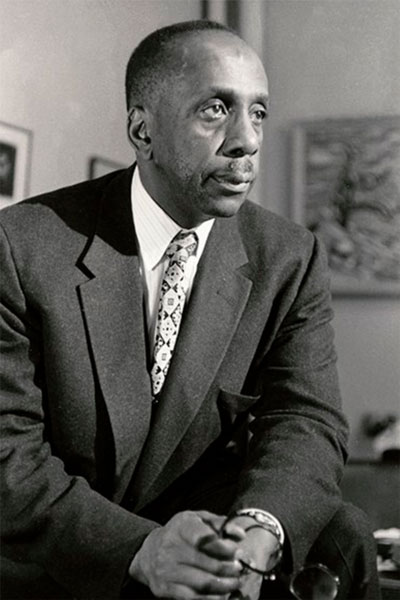
Howard Thurman (shown in 1965) was one of the leading religious figures of 20th century America. A major conference on his life and work, “The Unfinished Search for Common Ground,” will be April 8-9.
Emory University’s Candler School of Theology will host a major conference on the life and work of 20th century theologian and civil rights leader Howard Thurman. “The Unfinished Search for Common Ground” will take place April 8-9 and be available in both online and in-person formats. Visit the conference website to learn more and register.
“Issues of racial, gender, sexual, ethnic and religious diversity, discrimination and violence are as relevant today as they were during Thurman’s lifetime,” says Walter Earl Fluker, Dean’s Professor of Spirituality, Ethics and Leadership at Candler and editor of the Howard Thurman Papers Project. “I want people to explore and discuss what of Thurman’s work we might adopt and apply to contemporary society, and how we might harness Thurman’s ‘tools of the spirit’ for the development of a liberating spirituality that promotes social engagement.”
The conference will provide opportunities to hear from noted Thurman scholars and practitioners as well as time to gather in groups to discuss what is being heard. Plenaries will cover three broad topics: spirituality and social transformation, ecclesial and nonecclesial communities and interfaith understanding, and democratic life and practices.
Plenary speakers include Fluker; bestselling author, preacher and Episcopal priest Barbara Brown Taylor; author, historian and Thurman scholar Peter Eisenstadt; and Professor Emeritus of Church and Community Luther E. Smith Jr. Each plenary address will be followed by a panel discussion and an audience Q&A session. View the full conference schedule and the complete list of speakers.
The conference takes its title from Thurman’s influential 1971 book “The Search for Common Ground,” which also served as the defining theme that characterized his life and ministry, Fluker notes.
Fluker conceived of the conference to introduce attendees to Thurman’s work and provide an opportunity for scholars, social activists and religious leaders to consider how Thurman’s understanding of community can address issues of democracy, diversity and inclusion that still challenge us today.
“Raising Thurman’s public profile and introducing him in a venue where scholars, students, activists and religious leaders can engage his thought in conversation with one another is of paramount importance,” says Fluker.
“The Unfinished Search for Common Ground” is sponsored by Candler School of Theology and the Howard Thurman Papers Project, with additional support from The Candler Foundry; Emory University’s Office of Diversity, Equity and Inclusion; Emory’s Office of Spiritual and Religious Life; Candler’s Black Church Studies Program; and Glenn Memorial United Methodist Church.
Register here to attend online or in person. Online registration will be available through April 7, while in-person registration will close on March 28.
About Howard Thurman
One of the leading religious figures of 20th century America, Howard Washington Thurman (1899-1981) played a central role in pivotal social justice movements and organizations. He was among the first prominent African American pacifists and led the first delegation of African Americans to meet with Mahatma Gandhi in 1936. His theology of nonviolence, outlined in his seminal publication “Jesus and the Disinherited” (1949), influenced and shaped a generation of civil rights activists. He was a key mentor to leaders within the movement, including Martin Luther King Jr. His insistence on the integrity and centrality of personal religious experience was at the core of his message, which he communicated for more than 50 years in colleges, schools and churches — and in 20 books, pamphlets, sermons and lectures, and dozens of articles.
